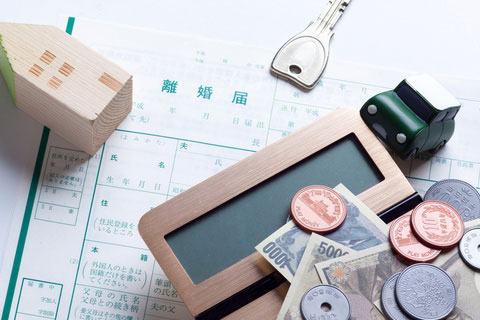International Divorce in Japan
In the case of international divorce (one spouse is a Japanese national and the other spouse is a non-Japanese national) in Japan, the issues such as whether it is possible to divorce, property distribution, monetary compensation (damages for mental suffering, solatium or consolation money), child support to bring it up, parent-child visitation and contacts etc. may be arisen.
When you wish to divorce, we think that basically you need to consider issues from the standpoint of (1) whether it is possible to divorce, (2) monetary matter and (3) child matter.
Whether it is possible to divorce legally in Japan

Under the Japanese laws, a spouse cannot divorce at his/her sole discretion. Basically a mutual agreement between spouses are needed to divorce in Japan. Divorce based on the spouses’ mutual agreement without a Japanese court is called “Kyogi-Rikon” in Japanese. In this case, the spouses both fill a Divorce Paper (it is called “Rikon-Todoke” in Japanese. Witnesses are also needed.) based on their mutual agreement and they submit the Divorce Paper to the local government in Japan, then they can divorce under Japanese laws.
However in the event that a mutual agreement is not obtained, firstly it is necessary to file a petition for mediation (conciliation) with a court for divorce in Japan (it is called “Chotei- Rikon” in Japanese). The mediation (conciliation) is a discussion between the parties in the court with the court as mediators (conciliation commissioners) and if a mutual agreement for divorce is not obtained from the other party, then it is necessary to file a lawsuit for divorce with the court (it is called “Saiban-Rikon” in Japanese).
In a divorce lawsuit in Japan, it is examined whether there is a reason for divorce stipulated in Japanese Civil Code. Infidelity (illicit love affair, or adultery), no bearing/payment of living expenses and no return home for long time, domestic violence/abusive expression, critical psychiatric disorder are examples of reasons. In addition there is a case that living apart for a long time may be a reason for divorce.
In order to win a divorce lawsuit, certain evidence is necessary. It is important to secure evidences of adultery, violence etc. Our office is in a position to give an advice for such evidences.
Monetary matter regarding the consolation money (compensation), distribution of property, etc.

Under the Japanese laws the spouse who caused a reason for divorce should pay the consolation money. A typical example of such cause is infidelity. The amount of the consolation money varies depending upon the cases. There were cases in the past that the money in the neighborhood of one million yen was ordered by the Japanese court and that the one close to ten million yen was ordered by the Japanese court. Our law office is in a position to provide a client with a rough idea of such amount of money after studying the situations of the client’s case.
The distribution of property between spouses under the Japanese laws, means to distribute the common property accumulated during marriage. Basically it is distributed equally between the spouses with some exceptions. The property includes real estate (such as house and land), financial property (such as cash, deposits, shares, bonds, etc.). Accordingly the property distribution may become a large amount.
Child matter (Parental Right, Custody, Child support, etc.)

Under the Japanese laws there are such matters as parental authority (parental rights), parent-child visitation or contacts and child support money pertaining to a child matter.
Parental authority (parental rights or custody) can be simply summarized to decide who of the spouses has the right to live with the child daily after the divorce. If there is no conflict between the spouses, they can decide the matter based on their mutual agreement. However, if no agreement is reached, a decision is made by a court. In such a case, who is the child’s caretaker, the age and will of the child and other matters are considered. Japanese laws allaw Joint Parental Rights (or Joint Custody) and Sole Parental Rights (or Sole Custody) from Apil 1, 2026 .
It is possible for the spouse who has no parental authority to visit and contact the child periodically. There is a case to agree to make such visitation and contact a few times a month at the time of divorce in view of each life of the divorced couple.
Child support money is the sum paid to the ex-wife or ex-husband who lives with the child by the ex-father or ex-wife who does not live with the child and basically it is decided by their mutual agreement. If a mutual agreement is not reached, a court decides the amount of child support money. Our law office is ready to provide our client with a rough idea of amount of child support money.
Incidentally expenses of married life are usually larger than child support money since they include the living expenses of the spouse.
Laws of which country are applicable to divorce (Governing law)
Japanese laws are not necessarily applicable to the proposed divorce and there is a case where laws of a foreign country are applied. It is difficult to mention generally which laws of a country are applicable, and the applicable laws are decided depending upon the situations of the divorce.
However if either spouse is a Japanese national and has “ Habitual Residence” (which is simply defined as the place where he or she lives for a reasonably long period) in Japan, a Japanese court will apply Japanese laws to this divorce case.
With which country’s court to file a divorce lawsuit (International jurisdiction)
If an agreement for divorce is not reached through mutual discussion or if either spouse is a national of a country where it is not possible to divorce by mutual agreement or conciliation (mediation), we think that it is necessary to file a divorce lawsuit with a court and in case that both of the spouses live in Japan, they may file a divorce lawsuit with a Japanese court.
However, if either spouse lives in a foreign country, it is necessary to study whether it is possible to file a divorce lawsuit in Japan (International jurisdiction). Generally it is a usual practice to file a divorce lawsuit with a court of the country where the defendant lives under Japanese laws. Accordingly as a principle in the event that the defendant lives in Japan, the divorce lawsuit can be filed in Japan.
Validity of judgment given by a foreign country’s court in Japan or validity of judgment given by a Japanese court in a foreign country
There may be a case, for example, where spouses of international marriage live in Japan but they do not get along with each other and that one of the spouses who is a non-Japanese national goes back to his/her mother country and further he/she wins the lawsuit which it files as the plaintiff in his/her mother country. In such a case there is a question whether the judgment of the lawsuit is valid in Japan.
Whether a foreign judgement is valid (enforceable) in Japan or not, this issue shall be decided in accordance wiht Japanese Civil Execution Act. This act stipulates some conditions to make a foreign judgement valid (enforceable) in Japan.
In order to make the divorce procedures in Japan valid in a foreign country, it is necessary to confirm the laws of the foreign country. With regard to such problem our law office is able to resolve the matter since we have working relationships with law offices in foreign countries.
Notice
Your use of this site is governed by the laws of Japan and any dispute arising out of or in connection with the use of any information or materials from this website shall be subject to the exclusive jurisdiction of the Tokyo District Court in Japan.
Our services shall be provided in Japan only.
We do not guarantee any courts or any authorities make decisions same as this website. We do not assume and accept any responsibility or liability regarding this website.
Contact us
Yamagami International Law Offices
【Tokyo】Roppongi Denki Building 7F, 6-1-20 Roppongi, Minato-ku, Tokyo 1060032, Japan
【Fukuoka】Koenoki Building 4F, 1-3-14 Maizuru, Chuo-ku, Fukuoka 8100073, Japan
Tel +81-92-739-2388
